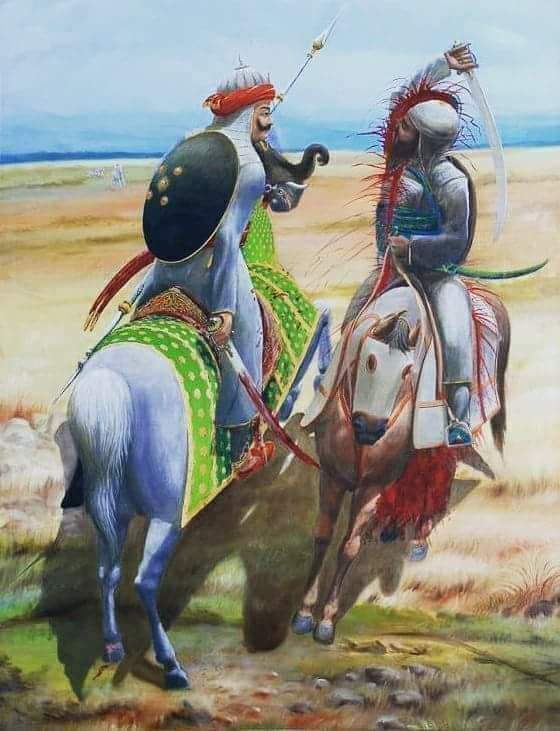Maharana Pratap, also known as Rana Pratap or Pratap Singh, holds significant status in historical narratives :-
Maharana Pratap Singh was a renowned ruler of Mewar, a region in present-day Rajasthan, India. He was born on May 9, 1540, and belonged to the Sisodia Rajput dynasty. Maharana Pratap is remembered for his valiant resistance against the Mughal Empire, especially during the reign of Emperor Akbar.
Maharana Pratap’s most famous battle was fought on June 18, 1576, against the Mughal forces led by Akbar’s general, Man Singh I. The battle was known as the Battle of Haldighati. Despite Maharana Pratap’s forces being significantly outnumbered, they fought fiercely. Although they did not achieve a clear victory, Maharana Pratap managed to maintain his independence.
Throughout his life, Maharana Pratap remained dedicated to protecting his kingdom’s sovereignty and resisting Mughal dominance. His valor and refusal to submit to external rule have made him a symbol of Rajput pride and valor.
- Maharana Pratap’s life story and his struggle against the Mughals continue to inspire generations in India, particularly in the state of Rajasthan. He is celebrated as a legendary figure in Rajasthan and has been immortalized in literature, folklore, and popular culture. His tale has cemented his status as one of India’s most revered historical figures.

Maharana Pratap Singh of Mewar: A Legacy of Valor and Resilience
Maharana Pratap Singh, born on May 9, 1540, in the princely state of Mewar, is an enduring symbol of valor, resilience, and defiance against oppressive forces. As the ruler of Mewar, Pratap Singh faced formidable challenges, particularly from the expanding Mughal Empire under Emperor Akbar. However, his unwavering commitment to his people and his refusal to bow down to external domination have etched his name in the annals of Indian history as one of its greatest heroes.
Mewar, situated in the rugged terrain of present-day Rajasthan, held a strategic and cultural significance in medieval India. Its rulers, belonging to the Sisodia Rajput dynasty, were renowned for their martial valor and staunch defense of their sovereignty. Maharana Pratap emerged as a worthy successor to this legacy, embodying the quintessential Rajput ethos of honor, bravery, and sacrifice.
At the heart of Maharana Pratap’s saga
lies his legendary resistance against the mighty Mughal Empire. During Emperor Akbar’s reign, the Mughals sought to consolidate their control over the Indian subcontinent, employing diplomacy, warfare, and administrative reforms. However, Mewar, under the leadership of Maharana Pratap, stood as a bulwark against Mughal expansionism.
The defining moment in Maharana Pratap’s struggle against the Mughals came in the form of the Battle of Haldighati in 1576. Faced with overwhelming odds, Pratap Singh and his forces valiantly confronted the Mughal army led by Man Singh I. Despite being outnumbered and outgunned, Pratap Singh’s resolve remained unyielding. Though the battle ended inconclusively, with neither side achieving a decisive victory, it showcased Maharana Pratap’s indomitable spirit and his refusal to surrender to tyranny.
Following the Battle of Haldighati, Maharana Pratap embarked on a protracted guerrilla warfare campaign against the Mughals, employing hit-and-run tactics to harass enemy supply lines and disrupt their control over Mewar’s territories. His ability to evade capture and sustain resistance in the face of adversity earned him widespread admiration and respect, not only among his own people but also among rival Rajput clans and neighboring kingdoms.
Maharana Pratap’s legacy extends beyond his military prowess. He was also a just and benevolent ruler, deeply committed to the welfare of his subjects. Despite the hardships inflicted by constant warfare, he strove to uphold the principles of dharma (righteousness) and protect the dignity of his people. His court was adorned with scholars, poets, and artists, fostering a rich cultural milieu that celebrated the ethos of Rajputana.
In addition to his military exploits, Maharana Pratap’s personal life is also the stuff of legend. His steadfast loyalty to his kingdom and his unbreakable bond with his loyal companions, including his trusted steed Chetak, have been immortalized in folklore and ballads. Stories of his courage, sacrifice, and unwavering determination continue to inspire generations of Indians, reaffirming the enduring power of the human spirit in the face of adversity.
Despite facing numerous setbacks and challenges, Maharana Pratap remained resolute in his quest for freedom and dignity. His defiance against the Mughal Empire, though fraught with sacrifices and hardships, ultimately became a symbol of resistance against tyranny and oppression. Even in defeat, Maharana Pratap’s legacy endures as a testament to the enduring spirit of independence and self-determination.
Today, Maharana Pratap Singh is venerated as a hero not only in Rajasthan but across India. His valor and sacrifice have been commemorated in statues, monuments, and folk songs, ensuring that his memory remains alive in the hearts and minds of generations to come. His life serves as a reminder that true greatness lies not in the pursuit of power or glory but in the service of noble ideals and the defense of one’s principles, even in the face of insurmountable odds.
In conclusion, Maharana Pratap Singh of Mewar remains a towering figure in Indian history, revered for his exemplary courage, leadership, and commitment to justice. His legacy serves as a beacon of hope and inspiration for all those who cherish freedom, dignity, and the spirit of resilience. As we commemorate his remarkable life and achievements, let us reaffirm our commitment to upholding the values for which he so valiantly fought and sacrificed.